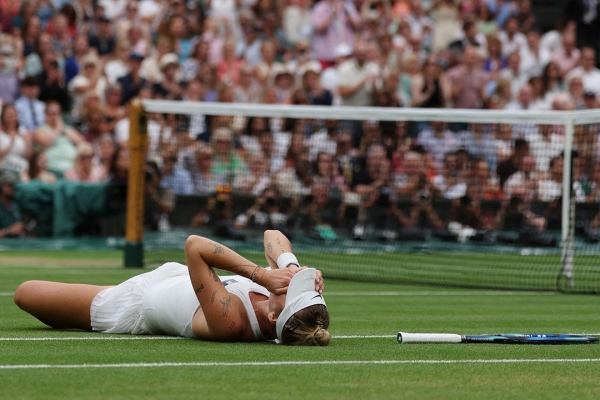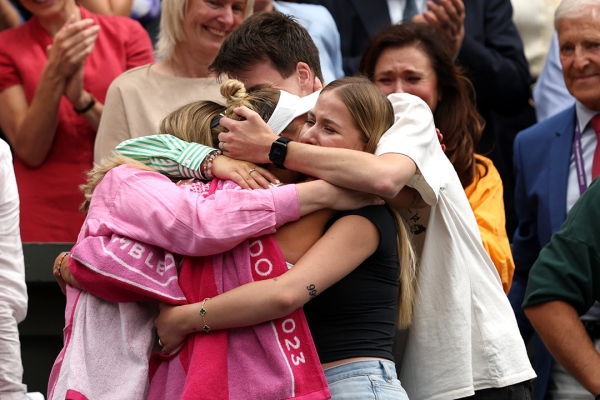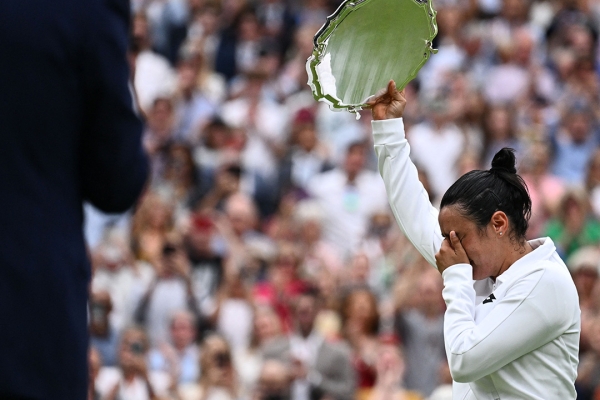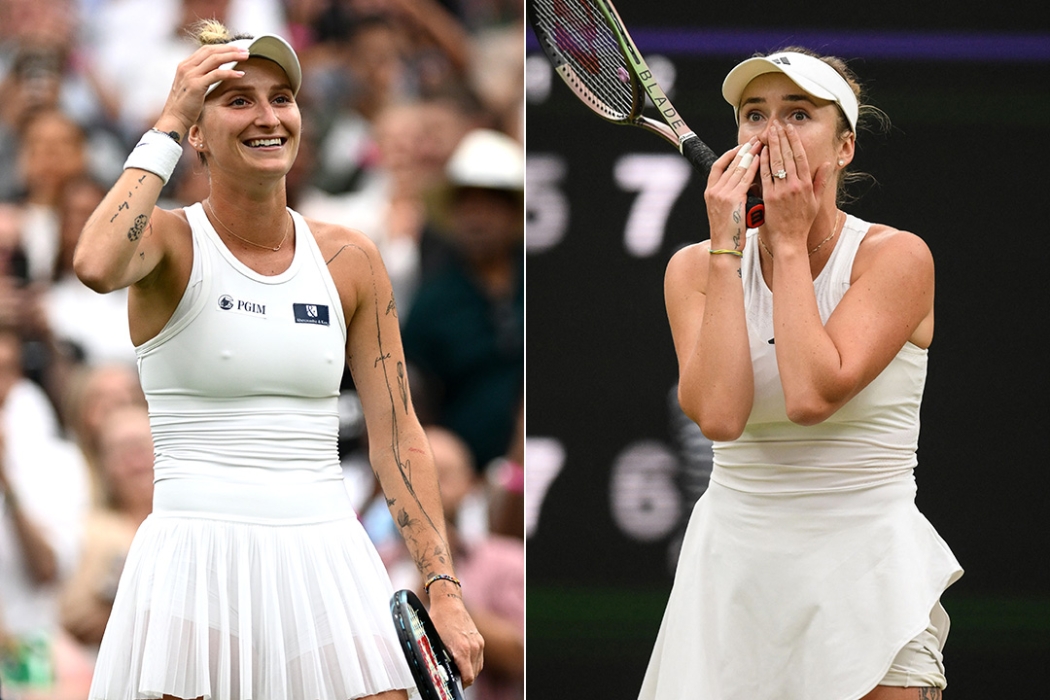Marketa Vondrousova contested the 2019 Roland Garros final as a teenager, and in her words, was “crushed” by Ash Barty. She won just four games.
Progressing to a second major final at Wimbledon this fortnight, four years on, she was determined to reframe how she experienced the moment.
“I just remember it was such a stress. I just wanted to do well. It was a big thing in Czech. Everybody was talking about it. It was very fast match and I didn't even, like, enjoyed it,” Vondrousova recalled of that French final.
“I was very sad after. I just told myself if this happens again, you have to enjoy every moment.
“Even if I would have lose today, I think I was just enjoy this moment. It's such a big achievement. I just really enjoy this match today.”

There was a lot to enjoy for the Czech, who advanced to the net, lunged to put away a volley, and closed out a 6-4 6-4 win over sixth seed Ons Jabeur to win her first Grand Slam title.
There was relief, and disbelief, as she collapsed to the court as the sport’s newest major champion.
At world No.42, she is the first unseeded woman in the Open Era to win at the All England Club.
Unseeded Grand Slam champions in women’s tennis are no new phenomenon; Vondrousova became the sixth in the past seven seasons.
Her unseeded status was slightly deceiving, given she was a former world No.14 who had also won an Olympic silver medal alongside her runner-up result at Roland Garros.
She has been plagued by injury struggles, undergoing multiple surgeries and losing, collectively, almost two years of competition as wrist and elbow issues stalled her momentum. This time last year, her wrist was in a cast; she watched a friend compete in the Wimbledon qualifying rounds while visiting London as a “tourist”.
A “crazy” campaign
Nevertheless, this is among the most unexpected runs to a Grand Slam title of all time. Especially when considering Wimbledon’s quarterfinal line-up.
It featured the world’s top four players, three of whom held all four major trophies between them. There was Jabeur, a former world No.2 and last year’s Wimbledon finalist. There was Madison Keys, another major finalist who peaked at world No.7. And there was the resurgent Elina Svitolina, a 2019 Wimbledon semifinalist and former world No.3 who for years was entrenched in the top five.
Vondrousova was the outlier, the only one never to be ranked in the top 10, and with the poorest grass-court record. She had never been beyond the second round at Wimbledon, and had previously won just four main-draw matches on grass in her life.
Unlike every other quarterfinalist, who had won multiple tour titles, and big ones, Vondrousova’s solitary tournament win came at the WTA 250 tournament in Biel, six years ago. She hadn’t reached a final in two years; the other seven quarterfinalists had all done so in the past six months.
Somehow, Vondrousova was the player hoisting the Venus Rosewater Dish at fortnight’s end.
“I would say 'crazy', for sure,” she replied, when asked to summarise her campaign.
“I didn't play well before on grass. When we were coming here, I was like, ‘Okay, just play without stress, just try to win couple of matches’. Then this happened.
“I mean, it's unbelievable. I think nobody would have told you this before when we were coming here that I even have a chance to win. I was unseeded. I mean, it's such a crazy journey.
“I can't believe it still.”

The 24-year-old began to believe something great was happening when she beat Veronika Kudermetova and Donna Vekic back-to-back, two excellent, in-form grass-court players. They were the first of five seeded players she would conquer en route to the title.
The weather gods were also in her corner. Rain forced the closure of the roof midway through the third set of her quarterfinal, and she rebounded from 1-4 down to stun fourth-ranked Pegula. The roof remained closed for her semifinal against Svitolina (rain) and the final against Jabeur (wind gusts).
“I'm used to playing indoors. We practice in Prague in winter indoors. I always play good indoors,” she commented. “I was like, yeah, maybe that's going to help me.”
Her strategy on Saturday was simple. She remained calm, believed in her game, and “just (tried) to put every ball into the play”.
It worked. And as much as Vondrousova enjoyed the experience of playing the final, Jabeur did not.
“The most painful loss”
It was hard to tell exactly whether Jabeur’s performance was hampered by emotional exhaustion, or nerves. She expended much energy getting to the final, beating four consecutive Grand Slam champions – three of them from a set down.
The match-up also proved problematic. Having thrived when countering the pace, power and hitting intensity of Petra Kvitova, Elena Rybakina and Aryna Sabalenka, Jabeur was offered none of that by the crafty Vondrousova.
Jabeur’s serve sagged, and she finished with 31 unforced errors to the Czech’s 13. From 4-2 up in the first set, and 3-1 in the second, she lost in 80 minutes.
She wept on court as she received her second straight runner-up plate, describing it as the most painful loss of her career.

“Honestly, I felt a lot of pressure, feeling a lot of stress,” admitted Jabeur, who has reached three of the past five major finals, but fallen to 0-3 in those finals.
“I was telling myself, ‘it's okay, it's normal’. I honestly did nothing wrong. I did everything that I could. But, yeah, I think things take time with me. Hopefully I will be like the others (players) that failed couple of times to do it and it will come after.
“I think Marketa just put the ball in, slices a lot… maybe adapting to her rhythm was very difficult for me. Plus the pressure and the stress of the final. I didn't think she made a lot of mistakes. I thought she served good. I think she played maybe a perfect final for herself.
“The more good results that I do, the more pressure I feel. But it is what it is. Like I said, I cannot force anything right now. It wasn't meant to be.
“Definitely this match, last year's match, the final of the US Open, will teach me how to win these finals. Will definitely keep learning, keep being positive. I think that's the thing that will keep me going.
“Otherwise, if I'm going to be depressed about it, it's not going to help much.”
Jabeur only needs to look at Vondrousova to know that consciously adopting a positive mindset can reap rewards.

The Czech will rise 32 places to make her top-10 debut in next week’s rankings, and will be fifth in the points race to the WTA Finals.
It is an extraordinary conclusion to a compelling tournament, and for Vondrousova, ultimate triumph and happiness after years of setbacks.
“I feel like I just believed in my game since the tournament started. I just felt really good,” she said.
“I talked to myself a lot in the matches. I knew I was playing good, so I just tried to stay calm and keep it together.
“I'm just so grateful and proud of myself.”

